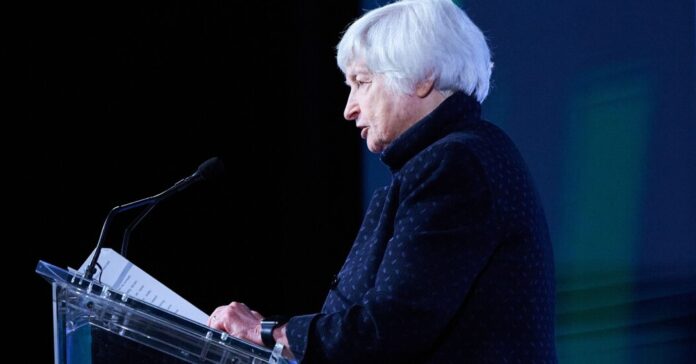When Treasury Secretary Janet L. Yellen arrives in Morocco this week to meet with her international counterparts, she will represent a nation that led the global economic recovery from the pandemic but is now grappling with potentially destabilizing political dysfunction.
America came dangerously close to defaulting on its debts over the summer and tiptoed toward a government shutdown last month as Republicans argued over the appropriate level of federal spending and whether to fund more aid for Ukraine. These events culminated last week in the removal of Rep. Kevin McCarthy as speaker of the House, a development that raises questions about whether the United States can actually govern itself, let alone lead the world.
The political dynamic is expected to test the United States’ credibility at the annual meetings of the International Monetary Fund and the World Bank, which begin Monday in Marrakesh. Ms. Yellen is expected to push European governments to provide more funding to Ukraine and push creditors like China to cancel the debts of poor countries, including many African nations.
The meetings come amid heightened global uncertainty due to Hamas’ weekend attacks on Israel, which threaten to escalate into a regional conflict. The possibility of a major war could pose new economic challenges for policymakers by driving up oil prices, disrupting trade flows and stoking tensions between other nations.
As she traveled to Morocco, Ms. Yellen reiterated America’s support for Israel.
“The United States stands with the people of Israel and condemns yesterday’s horrific attack on Israel by Hamas terrorists from Gaza,” Ms. Yellen said in a post on X, formerly Twitter, on Sunday. “Terrorism can never be justified and we support Israel’s right to defend itself and protect its citizens.”
In an interview on Sunday during her flight to Marrakesh, Ms. Yellen acknowledged that other nations were worried and concerned about the political gridlock that has gripped the United States. But she noted that other democracies face similar obstacles and that she believed America’s allies would continue to support the Biden administration’s efforts on issues such as protecting Ukraine and combating climate change.
“I think they have been pleased over the last two years that the United States has been able to return to very strong global leadership, and they want to work with us and want us to be successful,” Ms. Yellen said.
But America’s role as an economic bulwark against Russia’s war in Ukraine has been undermined by its own domestic policies, including Republican opposition to greater economic support for Ukraine. The United States’ enormous debt burden and its inability to find a more sustainable fiscal path have also damaged its economic credibility.
“The rest of the world can only look on with shock and concern at our dysfunction — we vacillate from threats of default to shutdowns to the House adjourning because there is no speaker,” said Mark Sobel, a former longtime Treasury Department official who is now one the U.S. chairman of the Official Monetary and Financial Institutions Forum, a think tank. “While foreign governments have always expected some degree of turmoil in the U.S., the current level of dysfunction will certainly undermine confidence in U.S. leadership, stability and confidence in the dollar’s global role.”
Eswar Prasad, the former head of the IMF’s China department, added that the instability of the U.S. economy could be problematic for some of the world’s weakest economies that rely on America as a source of stability.
“For countries already struggling to support their economies and financial markets, the added uncertainty caused by the political drama in Washington is extremely unwelcome,” Mr Prasad said.
The meeting comes at a sensitive time for the global economy. While the world appears poised to avoid recession and achieve a so-called soft landing, fighting inflation remains a challenge and output remains subdued. China’s economic weakness and Russia’s ongoing war in Ukraine continue to have a negative impact.
The higher borrowing costs that central banks are using to curb inflation have also made it harder for countries to manage their debt burdens.
This is a problem worldwide, including in the United States, where gross national debt is just over $33 trillion. Foreign demand for government bonds has been weak in recent months and concerns about the sustainability of America’s debt have increased. That makes it somewhat more difficult for the United States to advise other nations on how to manage their finances.
Ms. Yellen’s biggest challenge will be persuading other nations to continue providing robust economic aid to Ukraine as the war with Russia drags on. European nations are struggling with economic stagnation, and with disarray in Congress, it is unclear how the U.S. will continue to help Ukraine shore up its economy.
Ms. Yellen said she would tell her counterparts that supporting Ukraine remains a top priority. She said the Biden administration lacked good options to provide aid on its own and called on Congress to approve additional funding.
“Fundamentally, we need to get Congress to agree to this,” Ms. Yellen said. “There are no gigantic resources that we don’t need Congress to provide.”
Ms. Yellen dismissed concerns that the U.S. cannot afford to support Ukraine, arguing that the ultimate cost of handing the country over to Russia would be higher.
“If you think about the national security implications for us if we allow a democratic country in Europe to be overrun by Russia, and what that will mean for our own national defense needs and those of our neighbors in the future we” “I can’t afford it,” Ms. Yellen said.


















